tsmc
Latest
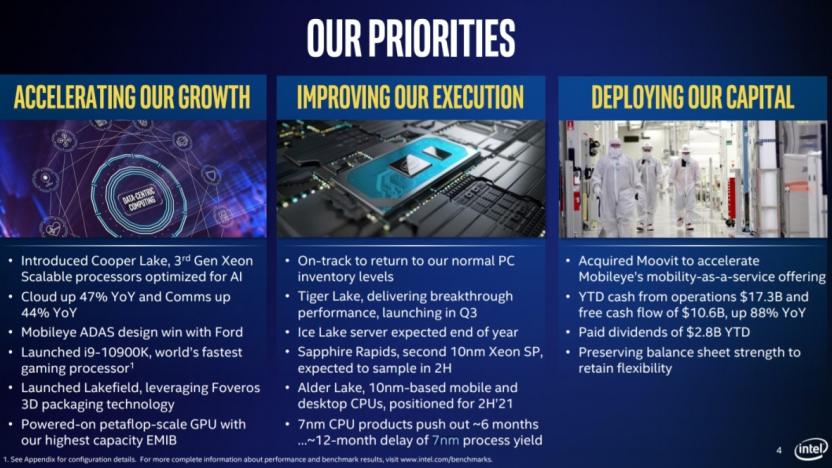
Intel's 7nm CPUs are delayed, won't arrive until at least 2022
Intel delivered bad news to its investors today, announcing that its plans for 7nm chips have slipped another six months, and yields are now running a year behind original projections. This comes after Apple announced plans to rely on its own CPUs for future computers, and as competitors like AMD and NVIDIA already take advantage of 7nm tech to build more efficient processors. Intel is accelerating its transition to 10nm products this year with increasing volumes and strong demand for an expanding line up.

The USA's latest trade legislation is more bad news for Huawei phones
The US Commerce Department has issued further crushing legislation against Huawei.
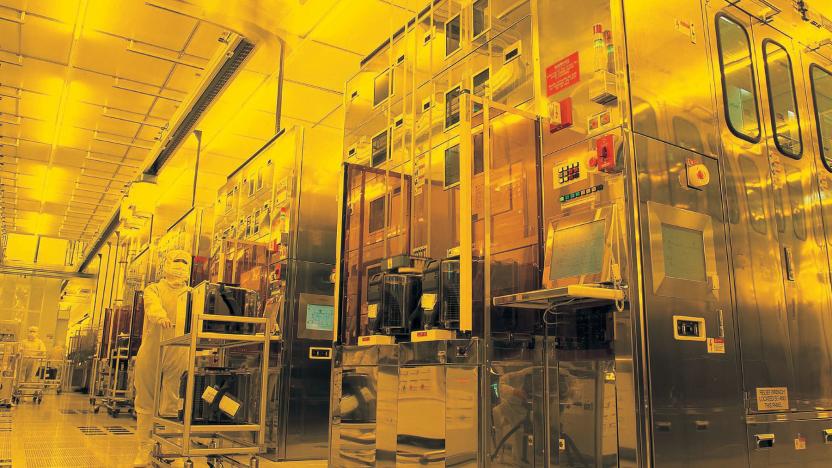
Apple chip-maker TSMC is building a $12 billion plant in Arizona
Taiwan Semiconductor Manufacturing Co. (TSMC), which manufactures processors and other chips for Apple, NVIDIA and many other firms, has confirmed that it will build a $12 billion chip fab plant in Arizona.
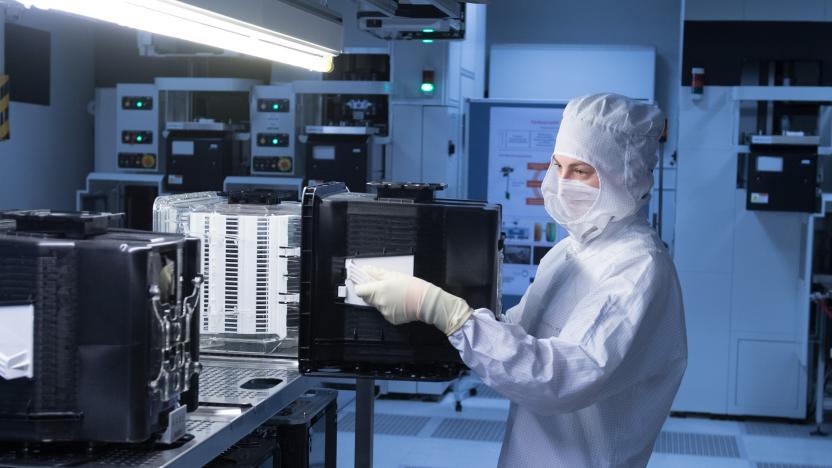
White House said to be in talks with Intel, TSMC for US chip factories
The White House reportedly hopes to reduce its dependence on Asia for processors by having Intel and TSMC set up US factories.

Major AMD chip supplier will no longer make next-gen chips
GlobalFoundries, which manufactures AMD's current Ryzen and Radeon chips, has surprisingly announced that it will stop all development work on next-gen 7-nanometer processors. Furthermore, it has no plans to develop future 5- and 3-nanometer technology, either. The company (which spun off from AMD in 2009) said it simply can't afford to spend billions of dollars developing new lines to keep up with its main rivals, Samsung and TSMC. Instead, it will stick to current-generation 12/14-nanometer processes and expand product offerings around that tech.

Qualcomm's 7nm Snapdragon chip will be ready for 5G phones
Qualcomm is keeping up its habit of using bleeding edge manufacturing for its mobile processors. The chip designer has confirmed that its "upcoming flagship mobile platform" will include a system-on-a-chip (read: the next Snapdragon) built using a faster, more efficient 7-nanometer process. You won't hear details about the chip itself until the fourth quarter of the year, but it will play nicely with the Snapdragon X50 5G modem -- conveniently, just in time for the arrival of the first mobile 5G networks.
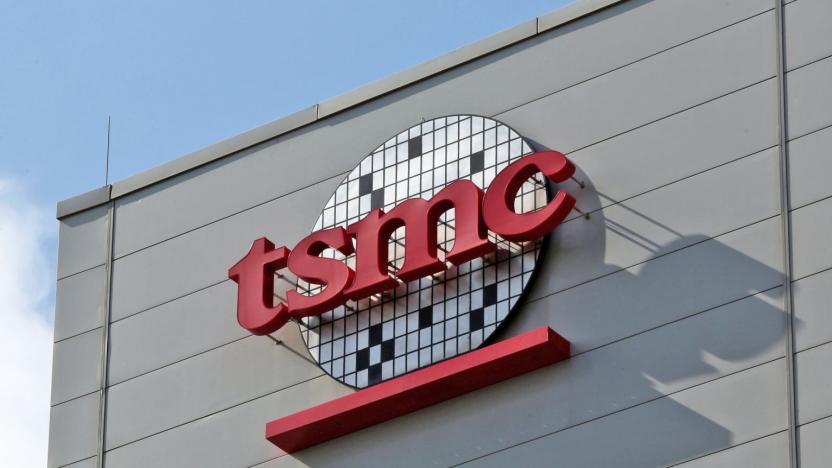
TSMC says virus that shut down its plants is a WannaCry variant
Over the weekend, chip manufacturer TSMC reported that some of its fabrication plants had to be shut down because of a virus that had infected the company's systems. While some were able to resume operations quickly, others were out of commission for up to a day. Now, TSMC has blamed a WannaCry variant for the disruption. Bloomberg reports that the company has resumed full operations but shipment delays are expected.

Chip giant TSMC struggles with virus infections at its factories
Many of the tech products launching this fall might have just run into production setbacks. Giant chip manufacturer TSMC has warned that several of its fabrication plants suffered virus infections on August 3rd, disrupting production. Some of these plants recovered in a "short period of time," it said, but others wouldn't resume business as usual for "one day." The company dismissed claims that this was a hack, but didn't initially provide details about the virus or the potential infection path.
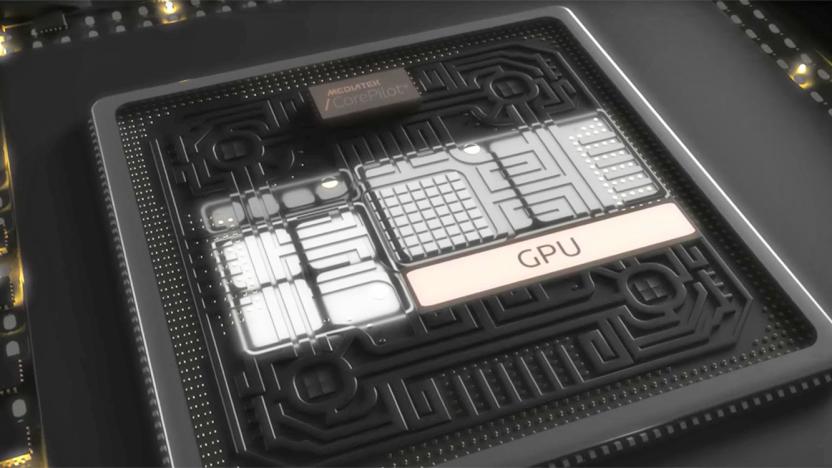
MediaTek's revamped 10-core chip will be hitting phones in Q2
MediaTek's first 10-core chips, the Helio X20 and X25, didn't exactly storm the smartphone market last year, but the company isn't ready to give up just yet. Following MediaTek's initial announcement back in September, the new 10-core Helio X30 is now finally entering mass production, with the first devices expected to arrive some time in Q2 this year. For those who aren't already familiar with this piece of silicon, the X30 is MediaTek's first move into 10nm fabrication, allowing it to join the likes of Qualcomm's Snapdragon 835 and Samsung's Exynos 9 Series 8895.

HoloLens' 24-core chip makes vivid AR possible
Microsoft has revealed more details about its HoloLens headset at the Hot Chips conference in Cupertino. The augmented reality (AR) device marries video games with the real world, so it needs to calculate your location, head position and gestures extremely rapidly. We now know more about the so-called holographic processing unit (HPU) that does that -- the 24-core chip has near-supercomputer levels of performance, performing a trillion operations per second.
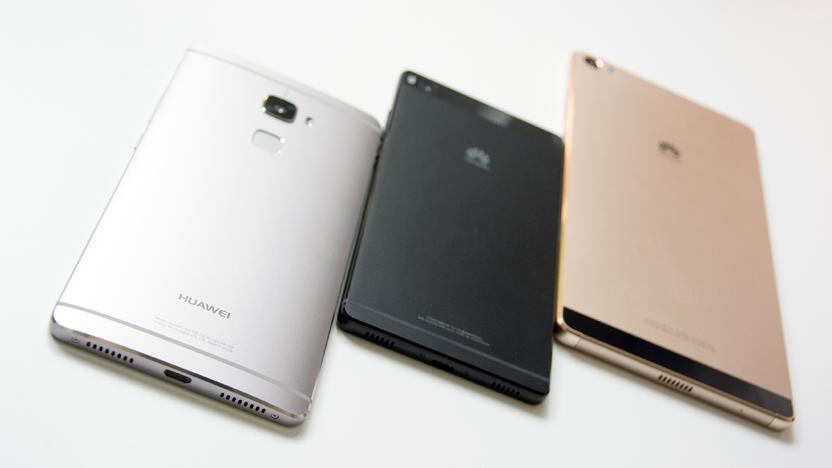
Huawei's next chipset may give competitors a run for their money
Huawei is now Europe's second largest Android brand, according to Kantar, but there's just no time for celebration. Not too long after launching the Huawei Mate S and the Nexus 6P, the Chinese telecom giant is already teasing the launch of the Mate 8 on November 26. Little is known about this new smartphone so far, but it'll likely be using Huawei's upcoming Kirin 950 chipset announced today, which joins the Apple A9 chip to be one of the first to use TSMC's 16nm FinFET Plus process for improved efficiency. Like its predecessor, the Kirin 950 has an octa-core processor but with much improved performance: 4 x Cortex-A72 and 4 x Cortex-A53 instead of the old mid-range offering of just eight Cortex-A53 cores. It also uses ARM's flagship Mali-T880 GPU so gaming should be blast on the phone.

iPhone 6s battery life may vary slightly depending who made the processor
A few days ago, it was revealed that the A9 chip in Apple's new iPhone 6s is manufactured by two different companies, Samsung and Taiwan Semiconductor Manufacturing Co (TSMC). More notably, reports started circulating that the battery life in the Samsung A9 devices was notably worse than that of the TSMC iPhones. Some tests have revealed that the TSMC chips last as much as two hours longer than the phones with Samsung silicon inside. Now, Apple has issued an official response that downplays the difference as only a matter of a few percentage points.

Apple to continue using Samsung to produce next-generation chip
Earlier this year, Apple and Taiwan Semiconductor Manufacturing Company (TSMC) inked a three-year deal for the chip manufacturer to produce A-series processors for iOS devices starting in 2014. While the move was seen as a strategic step away from relying on rival Samsung to produce the chips, it's now appearing that it is strictly a move toward diversifying supply away from a single source. The Verge, citing Korean daily Hankyung, says that production of the next-generation A8 chip will be handled primarily by TSMC with Samsung still grabbing about 30-40 percent of manufacturing. Chipworks found that Samsung is the manufacturer of the A7 chip used in the iPhone 5s at this time, so Apple is still relying on the Korean manufacturer for all of the processors used in the flagship iPhone. For future chips, however, it appears that TSMC is ramping up to take on a larger role in Apple's plans.

Apple rumored to need Samsung for some A8 chip production
There have been rumors that TSMC would handle some of Apple's future chip production, but details of the purported arrangement have been vague. The Korea Economic Daily may have just filled us in, however. It claims that Samsung will make 30 to 40 percent of Apple's A8 processors next year, with TSMC presumably assembling the lion's share. Apple wanted TSMC to be the sole manufacturer, but the challenge of building 20 nanometer-class chips led to a supplementary agreement with Samsung, according to the Daily's tipsters. Neither side has commented on the report, so take it with a large grain of salt. If the story is accurate, though, it suggests that Apple will have only modest success in excluding its arch-rival's technology from next-generation iOS devices. [Thanks, Byungjin]

Apple allegedly working with Samsung on chips again
Apple and Samsung have had a complicated relationship dating back to 2007 when Samsung became the exclusive producer of chips for Apple's iOS devices. Despite this business connection, the two companies have been attacking each other with a series of lawsuits claiming patent violations of functions on each company's phones. In April, we reported that Apple would be dropping Samsung's chips in favor of chips from TSMC, the Taiwan Semiconductor Manufacturing Co. Unfortunately rumors have surfaced indicating it doesn't appear that those plans are going to work out. Now the Korean Economic Daily is reporting that Apple's 2015 iOS device will still be using Samsung chips, specifically the 14-nanometer FinFET. These chips will power what is expected to be the iPhone 7. As of press time we don't know what this means for TSMC and Apple's relationship. It's possible the different chips will be used in different models of phones, with TSMC and Samsung both finding a home inside iOS devices. Still the idea of working with one company for 2014 only to move back to the old company you worked with in 2015 seems a little strange. We'll keep you updated if more information develops.

Apple allegedly working with Samsung again on chips for 2015 devices
Samsung has been exclusively making chips for Apple's iOS devices since the first iPhone started shipping in 2007 -- we don't need to tell you that makes for an odd relationship. Several months ago, The Wall Street Journal reported that Apple would switch to TSMC for next year's iOS portfolio, but now there's some strange news coming out of Korea. According to a local publication, Apple's 2015 iOS devices will use Samsung's 14 nanometer FinFET technology, starting with the iPhone 7 (not the 6S?). Why would Apple switch to TSMC for just one year and then go back to Samsung? Is Apple planning to rely on both TSMC and Samsung for different product lines? Unfortunately, we'll have to wait until Chipworks breaks out its microscopes to find out what's really going on.

TSMC reports record sales high for June, keeps rumors of an Apple deal alive
Taiwanese chip manufacturer TSMC just reported a record sales high for June, announcing a jump of 24.3 percent from a year earlier. That may be good news in and of itself, but TSMC's announcement also lends credence to reports that Apple recently clinched a deal with the manufacturer. Rumors about a Cupertino-TSMC alliance have persisted for years (literally), but given Apple's rocky relationship with its current silicon provider -- primary competitor in the mobile space -- Samsung, this move does make sense. Suffice it to say, we'll be waiting with baited breath for Tim Cook and co. to announce what's under the hood of the company's next-gen iPad and iPhone.

MediaTek to launch true 8-core, 2GHz MT6592 chipset in November?
Samsung may already have its 8-core Exynos 5 Octa offering, but the original "big.LITTLE" implementation means only up to four cores work together at any time -- either the Cortex-A15 quartet or its lesser Cortex-A7 counterpart. In other words, we'd rather rename the chipset range to something like "Exynos 5 Quad Dual." But according to recent intel coming from Taipei and Shenzhen, it looks like Taiwan's MediaTek is well on its way to ship a true 8-core mobile chipset in Q4 this year.

Apple and Samsung find breaking up is hard to do
The Wall Street Journal is reporting, following years of unsubstantiated reports from anonymously sourced tech blogs in the far east, that Apple has finally inked a deal with Taiwan Semiconductor Manufacturing Co (TSMC) to manufacture the series A-x chips that power Apple's mobile devices. This month, after years of technical delays, Apple finally signed a deal with Taiwan Semiconductor Manufacturing Co. to make some of the chips starting in 2014, according to a TSMC executive. The process had been beset by glitches preventing the chips from meeting Apple's speed and power standards, TSMC officials said. Despite the deal, Samsung will remain the primary supplier through next year, one of these executives said. Ah yes, Samsung. Apple and Samsung certainly make strange bedfellows to the extent that Apple is one of Samsung's biggest customers and yet the two companies are currently embroiled in patent litigation that spans multiple continents. Apple has been using Samsung to supply it with mobile components for some time now, but once Samsung started, dare I say, copying the iPhone's look and feel, Apple began trying, as best as it could, to lessen its reliance on Samsung. Breaking away from Samsung completely, however, hasn't been easy, or at the very least, practical. Apple has cut back on some purchases. It no longer buys iPhone screens from Samsung and has reduced iPad screen purchases, suppliers say. And Apple has been buying more flash memory chips -- an essential component for storing data -- from other makers, say former Apple executives and officials at another chip supplier. But Apple remains critically dependent on Samsung. The microprocessor brains that control iPods, iPhones and iPads are Samsung-built. And some new iPads still use Samsung screens, according to examinations of the devices by industry analysts. It's no secret that Apple likes to have as much control over their products as possible, and it must irk Apple to no end that they continue to enrich a company that they feel "slavishly copied" their most popular and profitable product. If we've learned one thing from Google's foray into the mobile market with Android, it's that Apple doesn't take too kindly to once-friendly companies who turn into competitors. With the the rollout of Apple's homegrown Maps app in iOS 6 and the eradication of YouTube from the default iOS homescreen, the iOS home screen has been effectively wiped clean of all Google properties. That's not a small point given that Google CEO Eric Schmidt was actually invited up on stage when Steve Jobs first unveiled the iPhone back in 2007. So, for now, Apple remains a top Samsung customer, contributing billions upon billions to the Korean-based company's bottom line. But if history is any indication, and if the report from the WSJ is in fact accurate, that won't be the case for too much longer.

Apple reportedly clinches TSMC chip manufacturing deal
Rumors of Apple switching its chip manufacturing from Samsung to TSMC have persisted for a long, long time. However, they may be more substantial this time around: the Wall Street Journal claims that Apple quietly signed a deal with TSMC earlier this month. The agreement reportedly has TSMC taking over some of Apple's chip production in 2014. Technical setbacks kept the agreement from happening any sooner, according to the sources. Neither company is commenting on the accuracy of the story, although few would doubt Apple's incentives to reduce its dependency on Samsung-made silicon -- it's not keen on funding a primary competitor.











